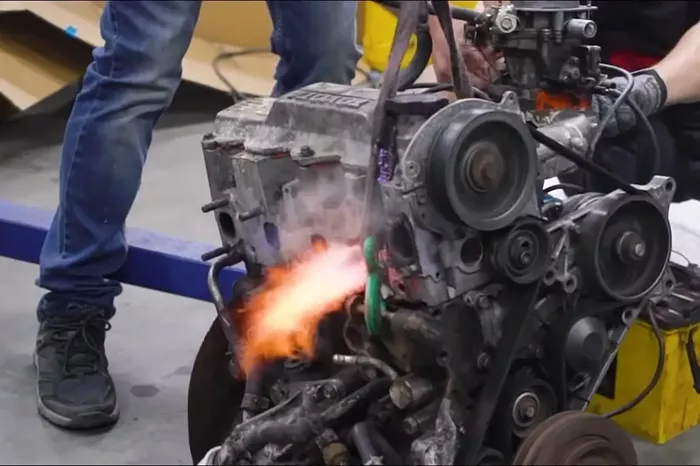In the realm of automotive engineering, the distinction between gasoline and diesel engines is fundamental. Each type operates on different principles of combustion, requiring specific fuel properties to function efficiently and safely. Despite these clear differences, a common question persists among vehicle owners and enthusiasts alike: can a diesel engine run on gasoline? This inquiry delves into the technical aspects of engine design, the chemistry of fuels, and the potential consequences of using an improper fuel type.
Understanding Diesel Engines and Gasoline Engines
Diesel engines and gasoline engines are both internal combustion engines, meaning they generate power by burning fuel within cylinders. However, their operational mechanisms and fuel requirements vary significantly.
Diesel Engines:
Diesel engines are renowned for their efficiency and torque, making them ideal for heavy-duty applications such as trucks, buses, and industrial machinery. The key characteristics of diesel engines include:
Compression Ignition: Unlike gasoline engines that use spark plugs to ignite the air-fuel mixture, diesel engines rely on high compression ratios to ignite the fuel. This process is known as compression ignition, where the heat generated by compressing the air in the cylinder causes the diesel fuel to ignite spontaneously.
Fuel Properties: Diesel fuel has a higher energy density and is less volatile compared to gasoline. It is composed of heavier hydrocarbons and contains fewer aromatic compounds.
Engine Design: Diesel engines are designed with higher compression ratios and stronger internal components to withstand the pressures generated during combustion.
Gasoline Engines:
Gasoline engines, found in most cars and motorcycles, operate on a different combustion principle:
Spark Ignition: Gasoline engines rely on spark plugs to ignite a precisely mixed air-fuel ratio. This ignition method allows for smoother operation at lower compression ratios compared to diesel engines.
Fuel Properties: Gasoline is more volatile and evaporates more readily than diesel. It contains lighter hydrocarbons and additives to enhance combustion efficiency and reduce emissions.
Engine Design: Gasoline engines typically have lower compression ratios than diesel engines and are designed with lighter components suited for higher RPM (revolutions per minute) operation.
See also: 8 Factors Affecting Gasoline Prices
Can a Diesel Engine Run on Gasoline?
The short answer is: No, a diesel engine cannot run on gasoline. The reasons behind this categorical statement lie in the fundamental differences in fuel properties and engine design between diesel and gasoline engines:
Ignition Process:
Diesel engines rely on compression ignition, where the high temperature resulting from compressing air in the cylinder causes diesel fuel to ignite. Gasoline, on the other hand, requires a spark from a spark plug to ignite because it is less prone to spontaneous combustion under compression alone.
Fuel Properties:
Diesel fuel has a higher ignition temperature and lower volatility compared to gasoline. If gasoline were introduced into a diesel engine, it would not combust properly during the compression stroke. Instead, it might ignite prematurely due to the heat generated by compression, leading to engine knocking and potentially damaging the engine’s components.
Engine Design Considerations:
Diesel engines are engineered with heavier-duty components and higher compression ratios to accommodate the combustion characteristics of diesel fuel. Introducing gasoline into a diesel engine could cause severe damage to components such as fuel injectors, pistons, and valves, which are not designed to handle the properties of gasoline.
Consequences of Using Gasoline in a Diesel Engine
Using gasoline in a diesel engine can have serious repercussions:
Engine Damage: The mismatch between gasoline’s ignition properties and the engine’s design can lead to misfires, overheating, and potentially catastrophic failure of engine components.
Operational Issues: Even if the engine runs momentarily on gasoline, it will operate inefficiently and unreliably. Power output will be compromised, and the engine may stall or fail to start.
Safety Concerns: Beyond mechanical damage, there are safety risks associated with using improper fuels, including the potential for fires or explosions if unburned gasoline accumulates in the exhaust system or leaks onto hot engine parts.
Myth Busting and Common Misconceptions
Despite the clear technical reasons why diesel engines cannot run on gasoline, some misconceptions persist:
Mixing Fuels: Some may believe that mixing diesel and gasoline in the tank could create a usable fuel blend. In reality, this mixture would not combust correctly in a diesel engine and could lead to immediate operational issues.
Emergency Scenarios: There is a persistent myth that adding small amounts of gasoline to diesel fuel can prevent gelling in cold weather. This practice is not recommended and can damage the engine’s fuel system.
Conclusion
In conclusion, the question of whether a diesel engine can run on gasoline is definitively answered by the stark differences in fuel properties and engine design between diesel and gasoline engines. Attempting to operate a diesel engine on gasoline poses significant risks of damage, inefficiency, and safety hazards. Therefore, it is crucial for vehicle owners and operators to adhere strictly to the manufacturer’s recommendations regarding fuel type and to avoid any experimentation with alternative fuels that could compromise engine performance and longevity.
As technology advances, the distinct advantages of both diesel and gasoline engines continue to be optimized for their intended applications, ensuring reliable and efficient transportation solutions across various sectors of industry and daily life.
Related topics:
Top 5 States With The Highest Fuel Taxes

